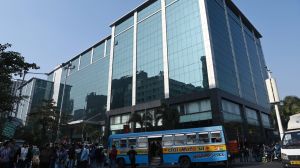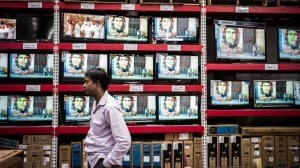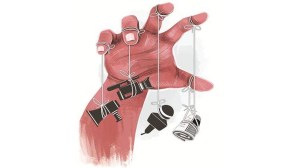Intel warning rattles tech sector confidence
SEPT 24: Shares of Intel tumbled 12-43/64 to 48-13/16, a drop of 21 per cent, erasing roughly 87 billion of the value from one of the w...

SEPT 24: Shares of Intel tumbled 12-43/64 to 48-13/16, a drop of 21 per cent, erasing roughly 87 billion of the value from one of the world8217;s most widely held stocks. With a dizzying 237 million shares traded by mid-afternoon, Intel was the most actively traded stock in a single day in Nasdaq history.
quot;When Intel sneezes, the rest of the technology sector gets a cold,quot; said Peter Gottlieb, portfolio manager with First Albany Asset Management in Chicago. Shares of personal computer makers and semiconductor manufacturers fell up to 10 per cent after Intel said it would grow third quarter revenues by 3 per cent to 5 per cent compared with the previous quarter, rather than the previous forecast range of around 10 per cent.
Software titan Microsoft Corp and International Business Machines Corp were also pulled down in the Intel downdraft, dragging the Dow down further. Intel, which cited weak European demand for the shortfall, left the industry puzzled as to the exact nature of the problem, but analysts dismissed the idea that the entire industry was shot through with the US chip maker8217;s troubles.
But there was no clear consensus among analysts on whether Intel8217;s troubles were company-specific or part of an incipient industry-wide downturn. Intel, the largest maker of computer chips, is usually considered an indicator of the health of the personal computer sector as well as a bellwether for the strength of the electronics industry.
However, communications chip maker Texas Instruments, trying to separate itself from a sell-off in semiconductor stocks, on Friday emphasised it was little exposed to the personal computer market and maintained earlier forecasts for third quarter revenue growth.
Merrill Lynch analyst Andrew Griffin in London said the warning quot;is certainly industry microprocessor specific and cannot be extended to the rest of the sector.quot; In Japan, Merrill analyst Hitoshi Shin said Intel8217;s troubles raised the specter that overall growth for the computer chip business was entering one of its periodic slowdowns.
quot;There is a chance that the worsening of fundamentals in the semiconductor business could arrive somewhat earlier than previously anticipated,quot; the Tokyo-based analyst cautioned.
Market research group International Data Corp said preliminary data showed that PC unit sales in western Europe were still on track to grow by some 14.5 per cent in the third quarter, double the growth rate in the first half of 2000.
quot;The fourth quarter is going to be strong also, with 19 per cent growth,quot; IDC industry analyst Andy Brown told Reuters. Most of that growth would come from consumers who want faster PCs to play digital video disc DVD games and benefit from high speed Internet access, analysts added. Semiconductor analyst Nicolas Gaudois at Morgan Stanley Dean Witter agreed, saying: quot;We don8217;T see a reversal in PC sales.quot;
However, European analysts said corporate demand there remained slack as companies saw few incentives to invest in new computers after the upgrades ahead of the millennium change. quot;We8217;re getting slightly conflicting signals,quot; Brown said.quot;There is some uncertainty whether the business market is picking up.quot;
Asian-European computer maker Fujitsu Siemens said on Friday that consumer demand was growing strongly, but it did not expect the corporate market to strengthen in the fourth quarter.
However, Dell Computer Corp, the world8217;s No 2 computer maker and Intel8217;s biggest single customer, has been hit by sluggish European sales itself in recent quarters. Dell stock was down 8 per cent on Nasdaq.
Other leading computer producers agreed that they did not share in Intel8217;s problems, wherever they may have come from. Computer makers recovered some losses after both Compaq Computer Corp and Hewlett-Packard Co issued statements their businesses were on track. Compaq and H-P are more exposed to Europe than other PC makers, getting more than 30 per cent of their total sales from Europe.
Compaq, the world8217;s largest PC maker, said European demand was quot;tracking within our expectations.quot; Shares were off 7 per cent, or 2-1/8 to 28-3/4. Hewlett-Packard said the PC industry remained on track for 15 per cent growth year-on-year, and its shares were actually up 3-9/16 to 103-1/2.
International Business Machines Corp would not comment ahead of third quarter results next month, and its shares were down 3 per cent, or 3-7/16 to 122-5/8.
Other chip makers crumbled after the Intel warning and monthly industry figures showing little improvement in order rates, leading a key analyst to downgrade the sector. The Philadelphia Semiconductor Index, a composite of 156 leading chip and chip equipment stocks, was off 8.67 per cent, or 85.22 to 899.29.
Intel8217;s biggest rival, Advanced Micro Devices Inc, was down 10 per cent, or 2-13/16, to 24-3/4, even as some analysts speculated that Intel8217;s troubles in Europe could be due to market share gains by AMD. quot;Intel could also be feeling increased pressure from AMD,quot;said Fortuna.
Influential SG Cowen analyst Tia-min Pang downgraded his rating on several of the makers of the equipment used to produce computer chips, based on what he said was increasing evidence that demand was slower than initially believed.
- 01
- 02
- 03
- 04
- 05































